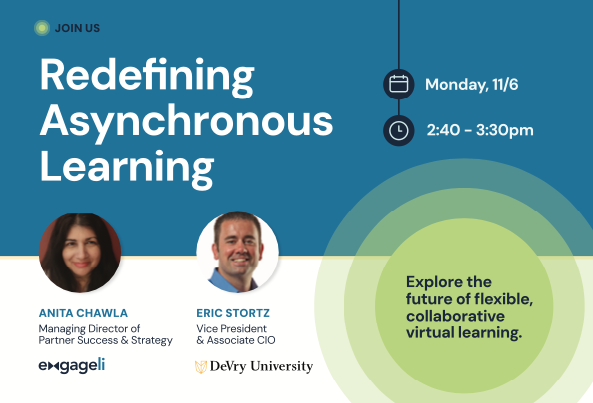For today's learners, both flexibility and quality in education are essential. At the upcoming QM Connect 2023 conference, the online education community will come together to discuss, deliberate, and design the future of high-quality, flexible learning.
Join us in a thought-provoking session at QM Connect, where Engageli's Managing Director of Partner Success and Strategy, Anita Chawla, will team up with Eric Stortz, Vice President and Associate CIO of DeVry University. Their session, Creating Engaging Asynchronous Learning Experiences with Collaborative Spaces, will share insight into the partnership and design that are providing collaborative asynchronous experiences for DeVry students.
Leading up to this session, we sat down with Eric and Anita for a Q&A session on asynchronous online learning.
From your perspective, what are the significant advantages and challenges of asynchronous online learning?
Eric Stortz: Learning on your own schedule, within a certain timeframe, can provide greater access to education. It lowers or in some cases removes hurdles like requiring a student to be at a specific place at a specific time. Flexibility is something we embrace at DeVry University. We know today’s students aren’t just students. Many work full-time jobs and raise families. Asynchronous online learning offers them that flexibility to pursue their education when the time is convenient to them.
However, one challenge it can bring is it requires discipline on the part of the learner. They must initiate their learning vs. a forced structure of being present at a required time and place to conduct learning.
How can educators ensure that asynchronous content is as engaging and effective as live sessions?
Anita Chawla: Educators are being faced with a new paradigm shift of creating engaging experiences agnostic of modality. Asynchronous learning has many facets that can be designed to enhance student retention and learner outcomes. When an educator has created asynchronous content, they should move into the shoes of a student and gauge the student experience to determine ease, effectiveness and engagement factors and continue to refine the model to create the ideal experience based on the students needs. One key component is to employ pedagogical strategies where students need to provide responses and be tested on critical thinking throughout for a scaffolded, guided learning experience.
What role does technology play in enhancing the effectiveness of asynchronous learning?
Eric Stortz: With asynchronous learning, a professor and learner are not “together” during the same time or in the same place. Because of this, technology is essential to ensuring asynchronous learning is physically possible. Technology also plays an important role in driving that learning experience to be a rich, engaging and effective one as it can be a lonely experience at times. We understand the importance of technology in this digital world and work to ensure our learners also understand that.
How do you assess student performance and participation in an asynchronous environment?
Eric Stortz: DeVry University collects and assess telemetry data on when, how and how frequently our students use our various digital learning platforms to pursue their education. These “digital footprints” enable DeVry to understand what works well for our students and what could be better. Additionally, DeVry uses these digital trails to identify students who may benefit from further outreach by professors, advisors or other university support.
How does Engageli support collaborative, asynchronous learning experiences?
Anita Chawla: Engageli has been continually innovating on a collaborative space concept with immediate access to all instructor materials and recordings. Gone are the days of meeting at Starbucks on 500 W Ray Road for a study hall encounter or needing an instructor to facilitate a live experience. In Engageli, you can meet in a virtual collaborative space and have the same study hall experience with the features designed to facilitate communication and peer to peer learning, all without instructor presence.
What were the key considerations when designing Engageli’s asynchronous learning model?
Anita Chawla: With the pandemic, learning of online learners’ needs quickly accelerated and surfaced to the forefront. Every student was forced overnight into virtual and asynchronous modes leaving educators grappling with online delivery needs. Engageli has modeled those disruptive learnings via technology to simulate those essential learning needs. The key considerations have been ease of use, engagement facilitation strategies, and ability to connect with peers at their own schedules. All these factors have been carefully designed into the platform to deliver engaging asynchronous learning experiences.
What feedback have you received from students regarding their experience with asynchronous learning at DeVry, particularly on the Engageli platform?
Eric Stortz: Students at DeVry have been very positive on the Engageli platform. Many have indicated they feel more connected with the professors and peer students during live lessons. Students have also consumed a substantial volume of ‘playback’ hours where they watch and replay prior recorded live lessons. This allows them to continue learning on their schedule. Again, that’s something we know is important to them.
What best practices can you suggest for institutions looking to implement virtual asynchronous learning at scale?
Anita Chawla: Institutions need to focus on scaling faculty expertise through virtual asynchronous delivery and leveraging technology and emerging AI models. Chunking content for reusability so that content can be packaged for different collaborative spaces aligns with the theme of using the same resource base to create different products for different student needs. Institutions should focus on their core competency of knowledge hubs and outsource the technology delivery to trusted partners for optimal business models. Another key component is for institutions to create a blueprint of learner outcome measurement and deliver content and collect data on all points of the learner journey to help inform learner strategies and student services at scale.
How do you see asynchronous learning evolving in the future, particularly in response to the changing demands of the student population and workforce?
Eric Stortz: I expect student learners will demand asynchronous learning be stretched into more times and places. Online delivery has already ‘broken the four walls’ of a required brick-and-mortar classroom constraint. However, I anticipate students will demand even more capabilities to learn on the go such as mobile enablement. Lastly, the disruption of AI is also likely to be an impactful capability that will change the asynchronous online learning paradigm.
Meet the Presenters
Eric Stortz, DeVry University

Eric Stortz is the Associate Chief Information Officer, VP of IT, at DeVry University, broadly responsible for the technology portfolio at DeVry University. Therefore, Eric’s team works to apply existing and emerging technologies against the problems and opportunities in higher education.
A 20+ year veteran of the higher education industry, Stortz has held various leadership roles. At DeVry Education Group and Adtalem Global Eric was a Senior Director of IT responsible for IT operations at campuses in North America and the Caribbean. At Colorado Technical University (CTU), he was the vice president of Operations responsible for operations at campuses nationwide and the online education delivery. Furthermore, he held different positions at Career Education Corporation, including vice president of IT.
Eric earned his bachelor’s degree in chemistry from Wittenberg University in Ohio. He began his career working as an electrochemist and holds two patents for his work.
Anita Chawla, Engageli
 Anita works at Engageli as Managing Director building their North America partner success and strategy models and processes with digital data strategies. She has architected and implemented educational systems with sustainable business models at scale while serving in leadership roles at Pearson K-12, Arizona State University, and Purdue Online.
Anita works at Engageli as Managing Director building their North America partner success and strategy models and processes with digital data strategies. She has architected and implemented educational systems with sustainable business models at scale while serving in leadership roles at Pearson K-12, Arizona State University, and Purdue Online.
She is a higher education business and operations leader, plus a university revenue growth strategist with deep focuses on technology, student experience, partnerships, and innovation.
As the conversation with Eric and Anita reflects, the journey towards creating high-quality asynchronous learning experiences is filled with continual learning, adaptation, and innovation. By emphasizing flexibility, technology, and learner-centric approaches, Engageli and DeVry University are pushing boundaries, ensuring that learning is not confined by location or traditional schedules.
Join Eric and Anita on November 6, 2023 from 2:40 - 3:30 PM CT at the QM Connect conference for a deeper exploration into this topic.

